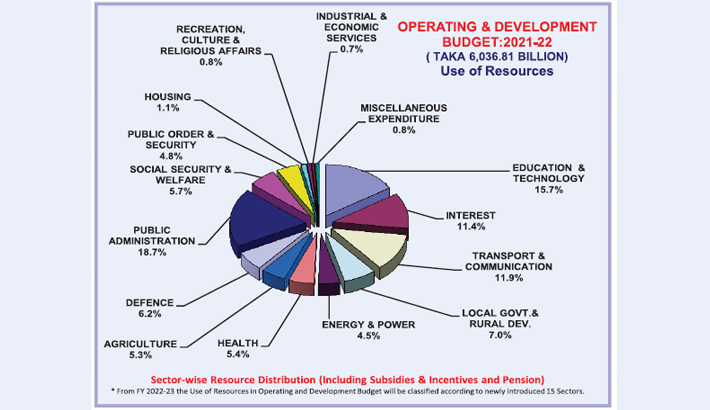Staff Correspondent
Published:2021-06-04 16:46:28 BdST
Series of reforms proposed to execute mega budget
The government has proposed a series of reform measures to implement the mega budget proposed for the fiscal year 2021-22.
AHM Mustafa Kamal on Thursday placed Tk 6,036.81 billion or GDP’s 17.5 percent budget for the upcoming fiscal year with a deficit of Tk 2,146.81 billion. This is the largest budget deficit in the history of Bangladesh.
“In ensuring balanced development, attracting investment and improving business environment, the importance of reform is immense,” finance minister said.
He said, “The country has been gradually moving from an agro-based economy to a production-oriented economy following the pursuit of effective government policies and strategies during the last 12 years.”
“Therefore, the contribution of agriculture to the GDP has been gradually declining and the desired structural transformation is taking place in the economy.”
Bangladesh has already been qualified for graduation from the least developed country to a developing country. “We need a strong industrial and manufacturing sector, which will help sustain high economic growth,” the minister emphasized.
The government is going to support mechanization of agriculture, development of the agro-processing sector, skill development and productivity enhancement.
It will also fund expansion of training and education related to 4th Industrial Revolution, encouragement of online based outsourcing work, self-employment/creation of new entrepreneurs, and encouragement of basic and practical research at the university level, Kamal said.
He said the government will take effective steps to build infrastructures and provide other policy supports to improve the investment-friendly environment.
To increase investment and generate employment, steps have been taken to establish 100 economic zones across the country, which will provide employment opportunity of an estimated one crore people.
“Approval has already been issued for the establishment of 97 Economic Zones. Production has already begun in nine Economic Zones and the development work in 28 Economic Zones is in progress, which have provided employment opportunity for around 40,000 employment seekers.” In addition, employment opportunities for another 8 lakh people will be created. Till date, investment proposal worth US$ 27.07 billion from a total of 210 investors has been received in these Economic Zones, of which about $1.60 billion is foreign investment.
The government is laying special emphasis on the implementation of projects under Public-Private Partnerships (PPP) to attract investment.
Currently, as many as 76 projects are scheduled to be implemented under the PPP, against which the investment worth $27.76 billion has been mobilized.
The process is underway to bring the manufacturing activities of export-oriented industries under the Customs Bonded System.
Efforts are going on to accelerate implementation of various reform activities to improve of the Ease of Doing Business Index, the minister said. One Stop Service (OSS) portal system has been in place since 2019 to provide all investment related services from a single platform.
All services related to land will also be brought under automation through 18 software.
To bring greater dynamism in the judicial process, steps have been taken to digitalise the overall justice system in the country.
The government has been providing adequate legal and financial assistance to the Anti-Corruption Commission to ensure transparency, the minister said.
The government is implementing various activities to reform and develop the financial sector. This includes banking sub-sector, capital market, insurance and other financial sub-sectors. Structural and sustainable reforms have been taken up to facilitate the overall development of the banking sub-sector including amendment to different financial sector laws.
“Efforts are being made to limit the average weighted interest rate on loans and deposits in sectors other than high-risk credit cards and consumer loans to a single digit level.”
He mentioned some steps to keep the liquidity management of the money market smooth.
The steps include, among others, redcuing of the Compulsory Cash Deposit Rate (CRR) to 4 percent for internal units of scheduled banks.
The government is implementing various reform measures to make the capital market dynamic and vibrant, Kamal said.
Unauthorized use or reproduction of The Finance Today content for commercial purposes is strictly prohibited.


